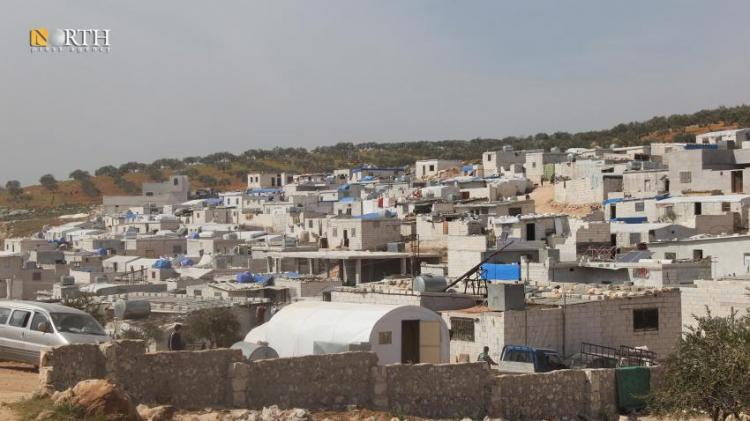Idlib – North-Press Agency
Internally displaced people (IDPs) in the northern countryside of Idlib, northwestern Syria, complain of the lack of aid recently provided to the IDPs, and what they call "inequality" by the supervisors distributing aid to the camps.
In the recent months following the military operation of the government forces in Idlib countryside at the beginning of this year, hundreds of ad-hoc or organized camps have spread in the northern and western countryside of Idlib.
Depriving some
Abdul-Salam al-Omar, director of Naseem al-Sham camp, told North Press that no relief baskets have been provided to the camp since the displacement of its residents about a year ago, except for some hygiene baskets provided by the Rahma Organization at the beginning of Ramadan, in addition to providing bread.
Naseem al-Sham camp, which was established in 2019, is located in the town of Gelli 23 km north of Idlib city. It houses 40 IDP families from the villages of the southern countryside of Idlib. The camp lacks all relief materials in addition to frayed tents and lack of equipment for bathrooms and sanitation.
Al-Omar called on the Department of Displaced People and Relief Organizations to go to the camp to see "the tragic conditions of the families, at the time that food aid, hygiene baskets, and health services are available in other camps nearby."
Outside the camps
The issue of deprivation from aid is not limited small and ad-hoc camps only, as thousands of IDPs in Idlib city and villages and towns in northwestern Syria suffer from a lack of aid and relief baskets.
Marwa al-Hassan, who is married and displaced with her three children from Hama countryside to Idlib city, said that she has not benefited since her displacement a year ago "except an emergency basket and a clothes card, knowing that the distribution of relief aid continues in the city on a monthly basis."
"If the aid goes to families who are in need more than us, I will not be sad, but if it goes to families who are not in need, and this is what is really happening, I will not forgive those in charge of organizing distribution queues,” she added.
Qutayba al-Zuhouri, director of the Barakat al-Insaniya organization that operates in opposition-controlled areas in northwestern Syria, said that the organizations work according to the division of sectors and regions among them, so they cover only those camps or areas.
He added that some of them stopped or the amount of aid decreased, "as a result of the donor stopping or delaying in paying the budget."
No improvement during Ramadan
Abdul-Salam al-Youssef, director of Al-Tah camp in Batenta, 8 km north of Idlib, said that the camp had recieved aid "for several months, even during Ramadan."
He called on charities and relief organizations to provide them with any kind of assistance during Ramadan "even if it is limited to bread or Iftar (the fast-breaking evening meal)."
There are about a million IDPs from all Syrian governorates in northern Idlib camps distributed among a thousand camps, according to the "Response Coordinators" team.
Ali Wahoud, an official in the Department of Displaced People, said that it is difficult for the organizations to cover all needs due to the large number of the camps. "There are small charities working on the issue of providing aid to ad-hoc and small camps that contain approximately 50 tents,” he said.
He added that the Department of Displaced People works to merge the small camps together, so that the number of the families in them increases to draw attention and facilitate the work of the organizations.

